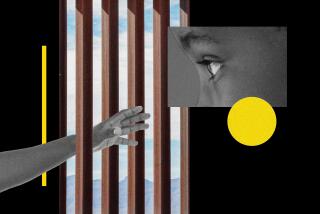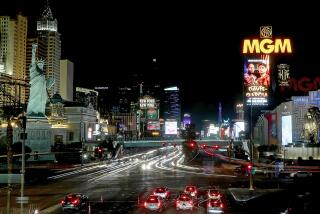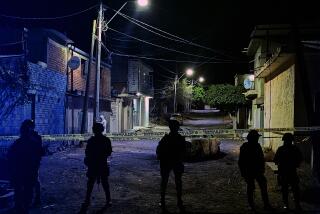Two London Suspects Are East Africans
Two of the four fugitives in last week’s failed transport bombings immigrated to Britain from war-torn East Africa as children and have been legal residents here for more than a decade, authorities said Tuesday.
As the nationwide manhunt entered its fifth day, police searched for explosives-related evidence in an abandoned white Volkswagen and a housing project where the suspects apparently lived. Forensic investigators made “significant finds,” the commissioner of the Metropolitan Police said Tuesday.
But all four would-be bombers, two of whom have not been publicly identified, remained on the run despite widespread distribution of their photos and repeated appeals for help from the public. Police believe the plot was linked to the July 7 bombings of three subway trains and a bus that killed 52 people, but a connection has not been confirmed.
Early today, four men were arrested in Birmingham, but it was not immediately known whether any were the would-be bombers.
One man was taken into custody under anti-terrorist legislation in the Hay Mills neighborhood, and a suspicious package was found, Scotland Yard said. Three others were arrested in the Washwood Heath neighborhood. In one raid, a suspect was shot with a taser.
Forensic exams were being carried out in both places.
On Tuesday, Prime Minister Tony Blair emphatically rejected accusations that Britain’s involvement in the Iraq war had worsened the danger of terrorism here. Not only had London already been a target, but the causes of Islamic terrorism go much deeper and further back in time than the war, Blair said. He denounced those who attempted to justify attacks by blaming U.S. and British foreign policy.
“Whatever excuse or justification these people use, I don’t think we should give one inch to them,” Blair said at a news conference. “Not in this country and the way we live our lives here, not in Iraq, not in our support for America.”
Asked what might drive a British-born Muslim to lash out against his own country, Blair blamed an increasingly widespread ideological discourse that demonized the West and promoted jihad.
“If it’s accepted as a matter of course ... it’s far less of a step to extremism,” Blair said. “We have to deal with the root causes of this.”
East Africa, the original home of the two publicly identified suspects, is one of the world’s poorest, most violent regions and a longtime hotbed of Islamic radicalism. The two joined a diaspora of immigrants and refugees who have found haven in Britain. The country has for years been Europe’s foremost magnet for immigrants, with one of the continent’s most open policies for granting political asylum and providing benefits and residence to refugees. Somalis in particular have been granted asylum or permission to stay because of the turmoil in their country.
Because the two men, now in their 20s, arrived here as children, they may have been radicalized in Britain. That’s a possible parallel to the July 7 bombers, three of whom were British-born sons of middle-class Pakistani immigrants.
London has served as a kind of bastion of radical ideologues from across the Muslim world, including representatives of Islamic networks from Somalia and elsewhere in Africa. The investigation will have to determine whether foreign recruiters or local clerics molded the would-be bombers.
The African connection in Thursday’s attacks has widened an investigation that initially targeted a network mixing homegrown operatives with masterminds in Pakistan who had already attempted at least one attack in Britain, officials say.
“We still have to understand what lies behind this,” said Ian Blair, the commissioner of the Metropolitan Police, in a televised interview. “But we do know that Al Qaeda is a shadowy organization which has links in East Africa, it has links in Pakistan, it has links in North Africa.”
Muktar Said Ibrahim, 27, the alleged would-be bus bomber, was born in Eritrea, a former Italian colony that was absorbed by Ethiopia and finally won its independence in 1993. Said came here with relatives as a child, gaining permission to remain in 1992 when he was 14, according to the Home Office, which handles law enforcement affairs, including immigration. Said applied for naturalization in late 2003 and was granted a British passport last September, a Home Office official said.
Said’s family went to the police as soon as they saw his picture on television, according to a statement they released Tuesday. Family members distanced themselves from him and the attempted attacks. They said he had left home in 1994, when he would have been only 16 or 17.
BBC television reported Tuesday night that Said had a criminal record and spent three years in prison, a familiar pattern among European militants from working-class families.
“We are a peaceful family, having lived in this country since 1990,” the family said. “We were shocked when we saw Muktar’s photo in the national news.... He lives alone elsewhere. He is not a close family member. He has not visited here for many months. The family wish to express their shock regarding recent events and in no way condone any acts of terrorism.”
Said either lived at or frequently visited an apartment in North London that police searched Tuesday, reportedly finding suspected bomb-making materials in the garage. His sometime roommate was Yasin Hassan Omar, 24. Omar was born in Somalia and arrived here in 1992 when he was 11, officials said. He was granted indefinite leave to remain in the country in May 2000, officials said.
Said and Hassan lived in public housing. Hassan received welfare payments, according to media reports, as have other accused militants including Abu Qatada, a cleric accused of being Al Qaeda’s chief ideologue in Europe. One tabloid headline thundered Tuesday: “The Bombers on Benefits.”
The revelations are likely to heat up a political debate about tightening Britain’s immigration and welfare policies and getting tougher with Islamic militants.
The knapsack bombs that Said and Hassan allegedly tried to detonate last week did not blow up because the explosive material failed, the police commissioner said.
But Commissioner Blair added in the TV interview that the bombs had the capacity to cause as much damage as those used July 7.
“These were major attempts at murder,” he said.
More to Read
Start your day right
Sign up for Essential California for news, features and recommendations from the L.A. Times and beyond in your inbox six days a week.
You may occasionally receive promotional content from the Los Angeles Times.






